Professor Shares Cancer Remission Journey
Every five years, Professor Mark Whitener uses himself as case study to impart lessons on disease, chemotherapy and life after cancer
Posted in: Homepage News, Science and Technology
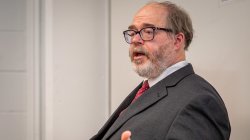
Every five years, to celebrate another milestone anniversary of being cancer-free, Chemistry and Biochemistry Associate Professor Mark Whitener gives a talk titled “Cancer Chemotherapy through the Eyes and Veins of a Chemist” at Montclair State University. This year marks his 35th year cancer free.
Whitener, now in his 30th year at Montclair, recently shared his cancer journey in a classroom in Richardson Hall and via Zoom with an audience made up of chemistry and biology students, faculty and the public.
Whitener’s background as a chemist and cancer survivor gives him a unique perspective, one he’s also documented in his online “Cancer Chronicles,” which he wrote 10 years ago to mark 25 years in remission and to serve a wider, non-academic audience.
At the outset, Whitener’s straight talk and humor, something that he, like many people faced with a serious diagnosis, adopted as a coping mechanism, are evident. Displaying a photo of himself as a young bald man, he says, “Most of my hair is gone due to male pattern baldness but I was 27 years old when this happened…because I had cancer chemotherapy.”
He explains that his presentation, which includes handwritten slides and cartoon-like drawings, is messy and not polished and that the 62-year-old will be turning 35 because he celebrates his “second birthday” from the last day of his chemotherapy treatment.
“I like it being messy because going through cancer is pretty messy,” he says. “Cancer is bad but there are some good stories. I’m an example of a successful, positive outcome from cancer.”
With that he launches into his introduction of how cancer cells grow and spread, chemotherapy treatment and his personal bout with non-Hodgkin’s lymphoma as a case study.
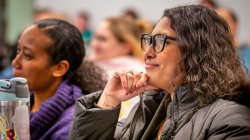
“I’m going to say some scary things during this talk,” he says before adding, “Everyone in this room has a cancer cell in you right now…but you also have an immune system.”
He also shares that “cancer is not one disease; there’s a hundred different cancers” and American Cancer Society statistics on various types of cancers among Americans, as well as survival rates. “You have a risk of one in 2.5 – or two out of five people – of getting cancer,” he says, telling the mostly college-age crowd, “Most cancers are in older people.”
That was not Whitener’s experience. While in graduate school at Harvard University, he noticed what he thought was a pimple on his right temple. He was healthy and had no family history of cancer, so that never entered his mind. But then the “pimple” grew to the size of an English pea and soon classmates were asking if he’d bumped his head. He decided to get it checked. The doctor told him it was a cyst that could easily be removed. During the surgical procedure, however, he heard, “Oops.”
“Of all the words one would care to hear from a man with a knife to your head, that ranks pretty low,” Whitener says, adding that the doctor became nervous and engaged him in small talk. Soon he learned why.
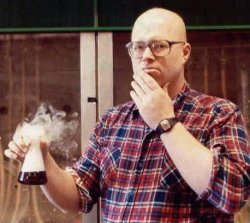
Whitener’s world went, as he put it, “BOOM!” As he explains in his Chronicles: “Being told you have cancer is like having a shotgun go off near your head. It is very disorienting, and one tends not to hear much for a while.”
While his doctor delivered the bad news about cancer, he said the good news was that Whitener was in Boston, home to the Dana Farber Comprehensive Cancer Center, which is where he sought treatment.
Studying chemistry, he says he focused on the “chemo” part of chemotherapy, taking advantage of Harvard’s medical library to learn all he could about his cancer and treatment, as well as medicine and psychological factors. He also learned about “chemo-brain,” a mental fog related to cancer-treatment that can cause cognitive impairment or dysfunction. He says it took about a year and a half before it lifted and he felt more himself.
While his talk is heavy on science, delving into DNA, cell cycle and even a brief history of cancer treatments, his Cancer Chronicles are written in lay terms for non-scientists.
His sense of humor is evident in both: “My appearance was pretty funny. You take eyebrows for granted until you don’t have any.”
There are many purposes of his chronicles, including “catharsis, education, information, celebration.” He offers advice on how to support people battling the dreaded disease and also hopes to turn the chronicles into a book to help others affected by cancer.
Michael Berger, 11, attended the talk with his mother Computer Science Associate Professor Katherine Herbert, and asked Whitener which cancer is the “most dangerous?”
Whitener responds: “I’m going to answer that in a very cheeky way: It’s the one you have.” He pauses before adding that “pancreatic cancer is a very dangerous one because it generally is not able to be detected early and often has a very poor prognosis.”
Herbert, whose family is friends with Whitener, has lost many family members to cancer, including her mother. “We have always been honest with our children about why my parents aren’t around and certain other people – overwhelmingly, it has been cancer,” Herbert says. As a result, her son has shown an interest in cancer research, and has a lot of ideas about how cancer treatment can possibly be improved, Herbert says. “Hearing the talk from a scientist who had a personal stake in the outcome is a unique experience.”
Many in the audience were students in Chemistry and Biochemistry Professor David Rotella’s Chemical Literature class, including juniors Abigail Chang and Perla Huerta.
Afterward, Chang shared that family members in every generation have been diagnosed with or died of cancer. She said she found Whitener’s talk informative about “what cancer is and how we can treat it.” The Biochemistry major says she’s supporting her 45-year-old aunt who just completed chemotherapy and will start radiation treatment for Stage 4 uterine cancer by explaining information to her. “The best thing I can do is learn more about it,” she says, adding that she wants to help her aunt “overcome her diagnosis due to all of the science I learn.”
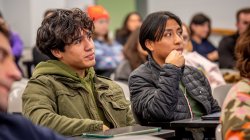
Sophomore Molecular Biology major Jeffrey Yumbla attended Whitener’s talk because he had a cancer scare and has pancreatitis. He liked that “it was presented in a way that was understandable for all audiences and because it dealt with a field of study that I am passionate about,” he says, adding that the talk has “reinvigorated my desire to become a medical- research doctor in order to contribute to the efforts against this disease.”
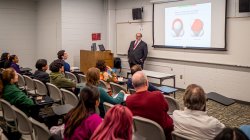
Asked by a colleague if his cancer journey has changed him, Whitener says he assumes the question is rhetorical before adding: “It did change my life, of course. Little things don’t bother me so much. When someone cuts me off in traffic, I just go, I’ve been through chemotherapy, that’s nothing.”
Later, Whitener, who says he was “pretty laid back” before his diagnosis and treatment, adds he’s been affected in other ways: “I’m more empathetic to people who have diseases. It’s made me appreciate my health more, appreciate the body more. It’s given me a greater appreciation for medicine.”
Not surprising from a man who closes his talk with a sincere thank you and a toast he wrote and posted on Facebook on February 9, 2013, the 25th year of being cancer-free.
Today, I will raise my glass:
To 25 years free from cancer,
To those who treat,
To those who care,
To those who pray,
To those who hope,
To those who love,
To those who fear,
To those who seek a cure,
To those who survive,
To those who fight,
To those who lost,
To those who have lost.
Hold dear to every hour you live.
Story by Staff Writer Sylvia A. Martinez. Photos by John J. LaRosa.
